Photo: Alberto E. Rodriguez/Getty Images for The Recording Academy
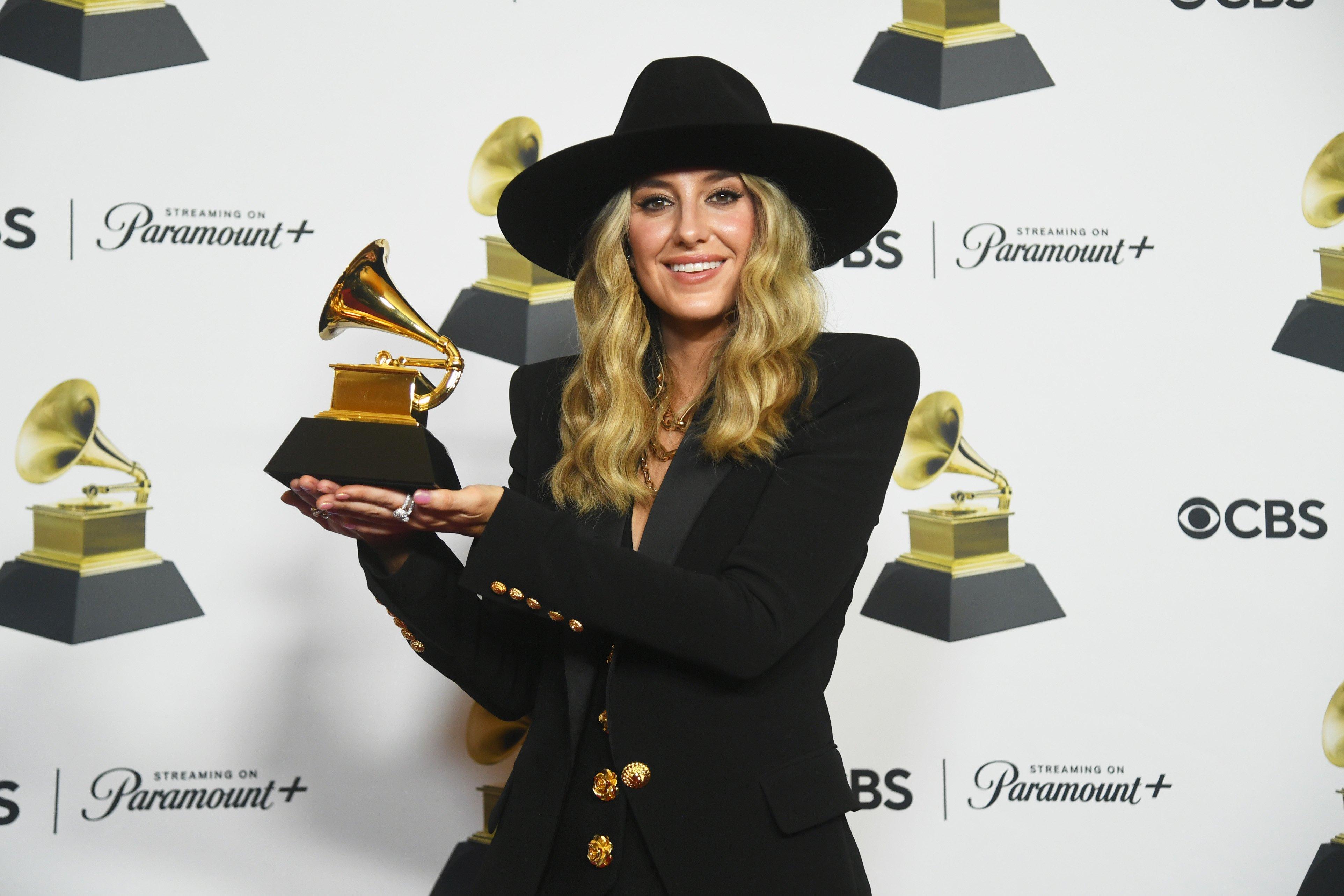
list
Big First Wins At The 2024 GRAMMYs: Karol G, Lainey Wilson, Victoria Monét & More
The 2024 GRAMMYs were momentous in a myriad of ways, including major firsts. Here's a rundown of big first wins by Paramore, Zach Bryan, Tyla and others.
That's a wrap for Music's Biggest Night! The 2024 GRAMMYs were extraordinarily stuffed with incredible moments, from performances to historic wins to unforgettable surprises.
Several of the most memorable moments came from first-time winners. In fact, there were 126 at the 66th GRAMMY Awards, spanning a wide array of talent across genres. From Colombian songstress Karol G to indie rock supergroup boygenius and country singer Brandy Clark, take a look at some of the biggest acts that took home their very first golden gramophones.
Miley Cyrus Celebrated Her First Wins With A Pumped-Up Performance
Miley Cyrus may have taken home the coveted Record Of The Year for "Flowers," but a different Category may have been the biggest achievement. Just before her performance on the GRAMMY stage, Cyrus won her first-ever golden gramophone for Best Pop Solo Performance.
"This award is amazing, but I really hope it doesn't change anything, because my life was beautiful yesterday," Cyrus said while accepting her first award.
"Flowers" is featured on Cyrus' 2023 album Endless Summer Vacation. "Flowers" was also nominated for GRAMMYs for Song Of The Year.
Karol G's First GRAMMYs Resulted In Her First GRAMMY
Karol G has had a meteoric rise over the past several years, and that continued unabated at Music's Biggest Night.
At the 2024 GRAMMYs Premiere Ceremony, Karol G won the GRAMMY for Best Música Urbana Album, for her 2023 LP Mañana Será Bonito. (She'd previously been nominated at the 2022 GRAMMYs, for the same category, for KG0516.
"Hello everybody, my name is Karol G. I am from Medellín, Colombia. This is my first time at the GRAMMYs, and this is my first time holding my own GRAMMY," she said, utterly concisely.
Victoria Monét Completed A Lifelong Goal…
Victoria Monét won big at the GRAMMYs, including taking home the award for Best New Artist. The singer also took home golden gramophones for Best R&B Album and Best Engineered Album, Non-Classical for Jaguar II.
Monét has been nominated for 10 GRAMMYs over her career as both a solo act and songwriter. When accepting the GRAMMY Award for Best New Artist, Monét compared herself to a plant growing from soil.
"My roots have been growing underneath ground, unseen, for so long, and I feel like today I'm sprouting, finally above ground," she said.
…And So Did Coco Jones
Monét’s fellow R&B nominee — and one-time collaborator — Coco Jones also turned a nearly 15-year journey into GRAMMY success, winning Best R&B Performance for her song "ICU."
Tyla, Me'shell NdegeOcello & Kylie Minogue Won In First-Time Categories
At the 2024 GRAMMYs, there were three new Categories — which meant three inaugural winners. South African singer/songwriter Tyla took home her first GRAMMY with her win for Best African Music Performance for her smash hit "Water," while Me'shell NdegeOcello and Kylie Minogue notched their second wins each, in the new Best Alternative Jazz Album and Best Pop Dance Recording Categories, respectively.
After 16 Years, Paramore Got GRAMMY Gold
Myspace-era alt wizards Paramore enjoyed a stunning resurgence with their 2023 album This Is Why. They'd been nominated in past ceremonies — their first nominations coming in 2008 — but at the 2024 GRAMMYs, they nabbed the trophy for the prestigious Best Rock Album Category. And with their first win, they made GRAMMY history: Paramore is the first female-fronted rock band to win Best Rock Album.
Lainey Wilson Continued A Massive Year With A GRAMMY
Much like Tyla, country star Lainey Wilson nailed it on the first try — as far as the Recording Academy goes. She was nominated twice at the 2024 GRAMMYs, and took home a golden gramophone for Best Country Album, for Bell Bottom Country.
Clearly, the phenomenon of a first-time GRAMMY nominee taking it home transcends genres and continents.
Second Time Was A Charm For Zach Bryan
Country great Zach Bryan's been nominated before — at the 2023 GRAMMYs, for Best Country Solo Performance, for "Something in the Orange."
This time, he brought home the golden gramophone for Best Country Duo/Group Performance, for "I Remember Everything." Bryan was also nominated for Best Country Album (Zach Bryan) and Best Country Song, also for "I Remember Everything."
First-Time Nominees Boygenius Won Three Times
Women dominated the 2024 GRAMMYs, which certainly applies to boygenius — who consist of three women, and cleaned up at the ceremony. And, they too were first-time nominees
Boygenius took home three GRAMMYs revolving around 2023's the record, including Best Alternative Music Album, Best Rock Song and Best Rock Performance — both for the stirring, gender-flipped "Not Strong Enough."
Peso Pluma Went From First-Time Nominee To First-Time Winner
Música Mexicana, stand up! Upstart Peso Pluma took home the GRAMMY for Best Música Mexicana Album (Including Tejano), for his tremendous album GÉNESIS.
As the status of Mexico on the global stage continues to swell, take Pluma's win as a sign to keep your ear to the ground.
Brandy Clark Left A Winner
Roots-heavy singer Brandy Clark's been nominated for 17 GRAMMYs over the years, but never gave up.
At the 2024 GRAMMYs, she won for Best Americana Performance for "Dear Insecurity" — and she played a corker of a version at the Premiere Ceremony with the string duo SistaStrings.
Fred again.. Proved To Be Dance Music’s Latest Hero
2022 saw Fred again.. rise as one of dance music's most promising new stars with the release of his compilation album, USB, and his third studio album, Actual Life 3 — and both helped him win his first pair of GRAMMYs in 2024. USB's "Rumble" (a collaboration with Skrillex and Four Tet) scored Best Dance/Electronic Recording, and Actual Life 3 took home Best Dance/Electronic Music Album.
Taylor Swift & Kacey Musgraves Celebrated Historic Firsts
While winning a GRAMMY was nothing new to 2024 winners Taylor Swift and Kacey Musgraves, they both had feats that marked big firsts in GRAMMY history. Swift became the first artist to be awarded Album Of The Year four times with her win for Midnights, while Musgraves' win for Best Country Duo/Group Performance for her Zach Bryan collaboration "I Remember Everything" made her the first artist to win in all four Country Field Categories.
Keep checking GRAMMY.com for stories about the 2024 GRAMMYs — and the Recording Academy thanks you for tuning into Music's Biggest Night! If you missed it, stream it on Paramount+ for maximum musical glory.
2024 GRAMMY Nominations: See The Full Winners & Nominees List
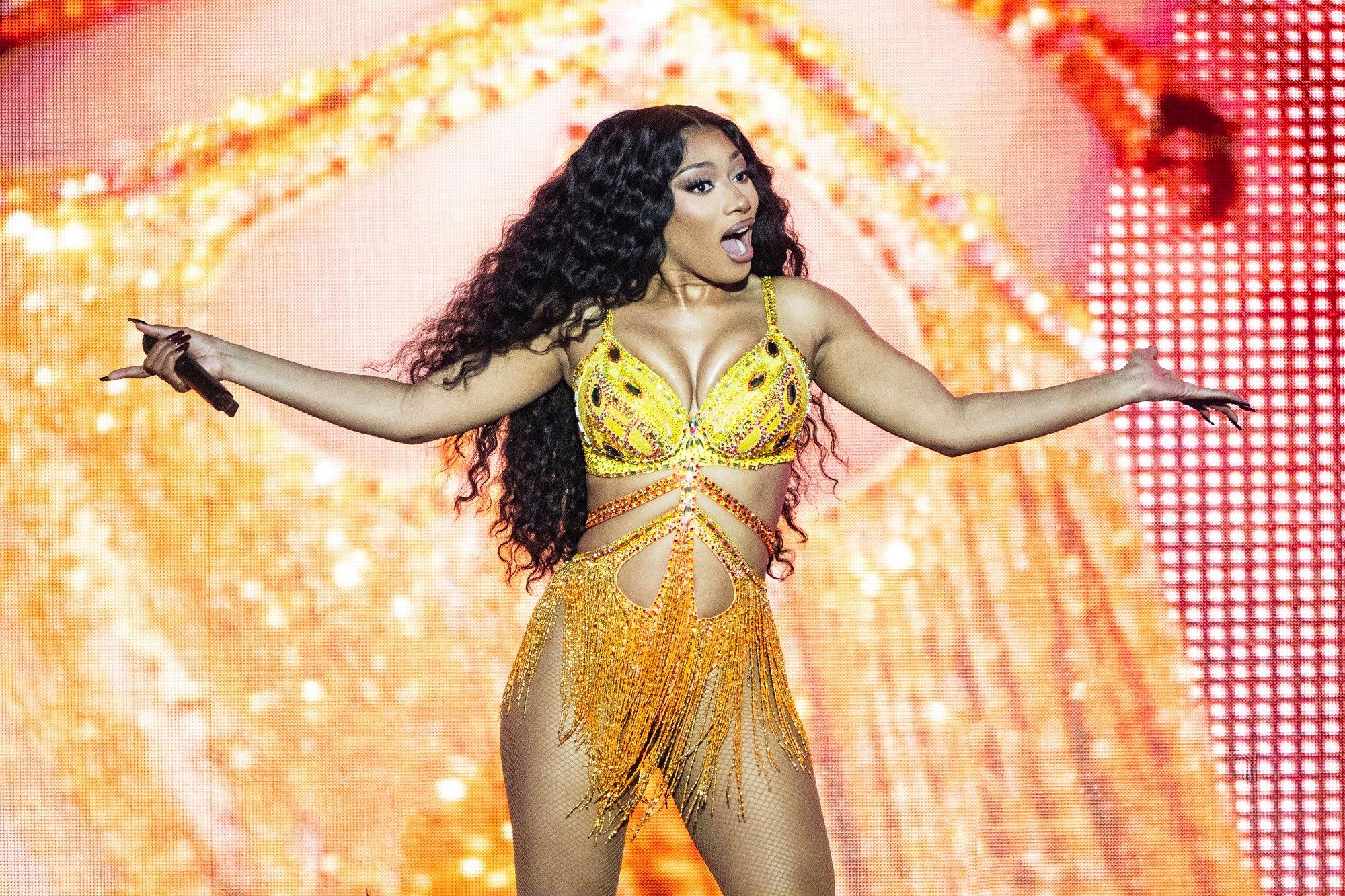
Photo: Erika Goldring/Getty Images
list
6 Takeaways From Megan Thee Stallion's 'Megan': Snakes, Shots & Self-Assurance
From the serpentine theme to Japanese rhyme schemes, Megan Thee Stallion's third album snatches back her own narrative and isn't afraid to take a bite.
Beware of venom: Megan Thee Stallion is not biting her tongue on her new album, simply titled Megan.
The GRAMMY winner's first full-length release in two years is also the first to drop under her own control. Fans have been ready for this release even before the first single, "Cobra," came out in November. The second single, "Hiss," followed in January and brought the star her first No. 1 hit on the Billboard’s Hot 100 and Global 200 charts. These songs, as well as the third single, "BOA," foreshadowed a certain slithery theme that helped shape the album.
Megan was released on June 28 and features guest stars such as GloRilla, Victoria Monét, Big K.R.I.T. and Kyle Richh as well as her longtime ace producers like Juicy J (who made "Hot Girl Summer" among other calling cards) and LilJuMadeDaBeat, who produced Stallion anthems like "Big Ole Freak," "Body" and "Thot S—."
Here’s what we learned from listening and vibing to the latest work by three-time GRAMMY winner Megan Thee Stallion.
A Theme Snakes Through Megan
As could have easily been predicted from the first three singles "Cobra," "Hiss" and "BOA," and now the album track "Rattle," there is a hint of a snake theme that wends its way through the album from beginning ("Hiss") to end ("Cobra").
In several songs, she denounces all the snake behavior that she has encountered from former lovers, friends, and haters who support those who have caused actual harm to her. In the music video for "Cobra," Megan literally sheds her old skin to reveal a shining new layer.
Megan Is Calling The Shots This Time
"I feel like Biggie, 'Who Shot Ya?’/But everybody know who shot me, bitch/ So now, let’s stop speaking on the topic," she rapped in "Who Me (feat. Pooh Shiesty)" off her 2022 album Traumazine. MTS was referencing the July 2020 incident in which rapper Tory Lanez shot her in the foot, and was subsequently charged with assault with a semiautomatic firearm and carrying a loaded, unregistered firearm in a vehicle.
Turns out, she wasn’t done referencing the topic. Now, she’s one taking the shots. MTS takes aim at less-talented women rappers on "Figueroa" (named for a Los Angeles street known for prostitution), and at Lanez on "Rattle," when she suggests that his male supporters should schedule a conjugal visit with him in prison. (Lanez is currently serving a 10-year sentence while simultaneously going through a divorce with wife Raina Chassagne.)
More Megan Thee Stallion News & Videos
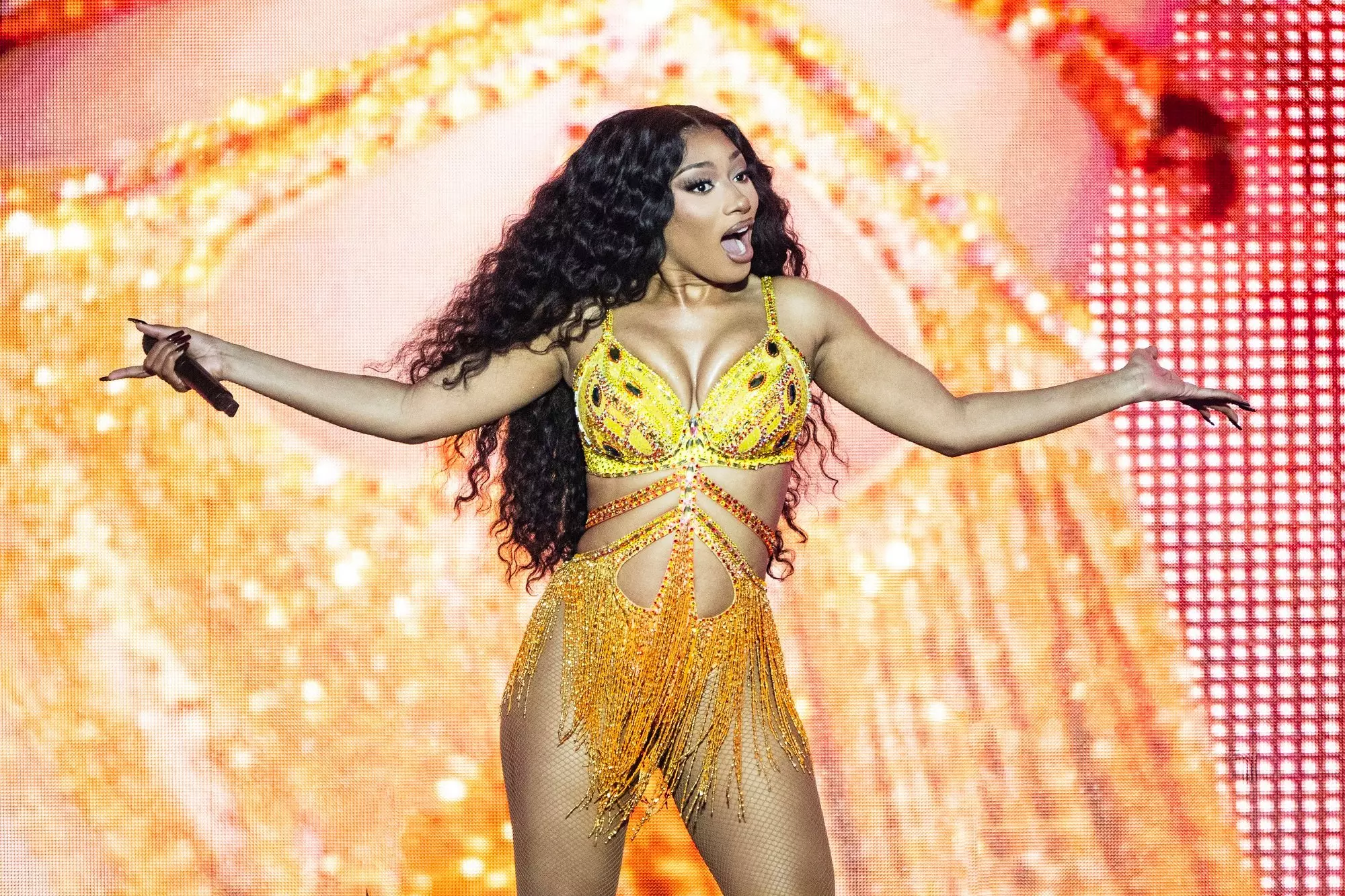
6 Takeaways From Megan Thee Stallion's 'Megan': Snakes, Shots & Self-Assurance
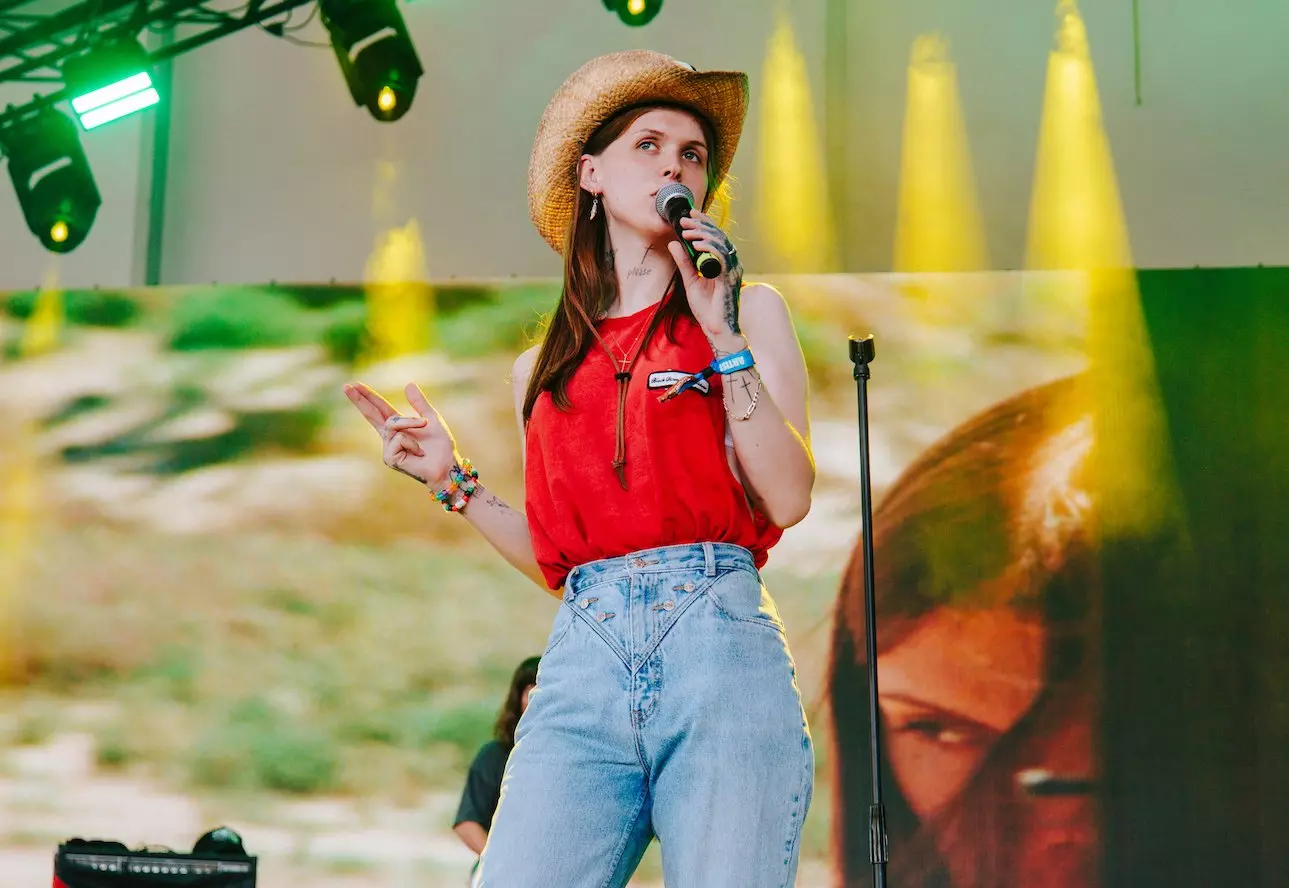
9 Epic Sets From Bonnaroo 2024: Ethel Cain, Melanie Martinez, Megan Thee Stallion & More
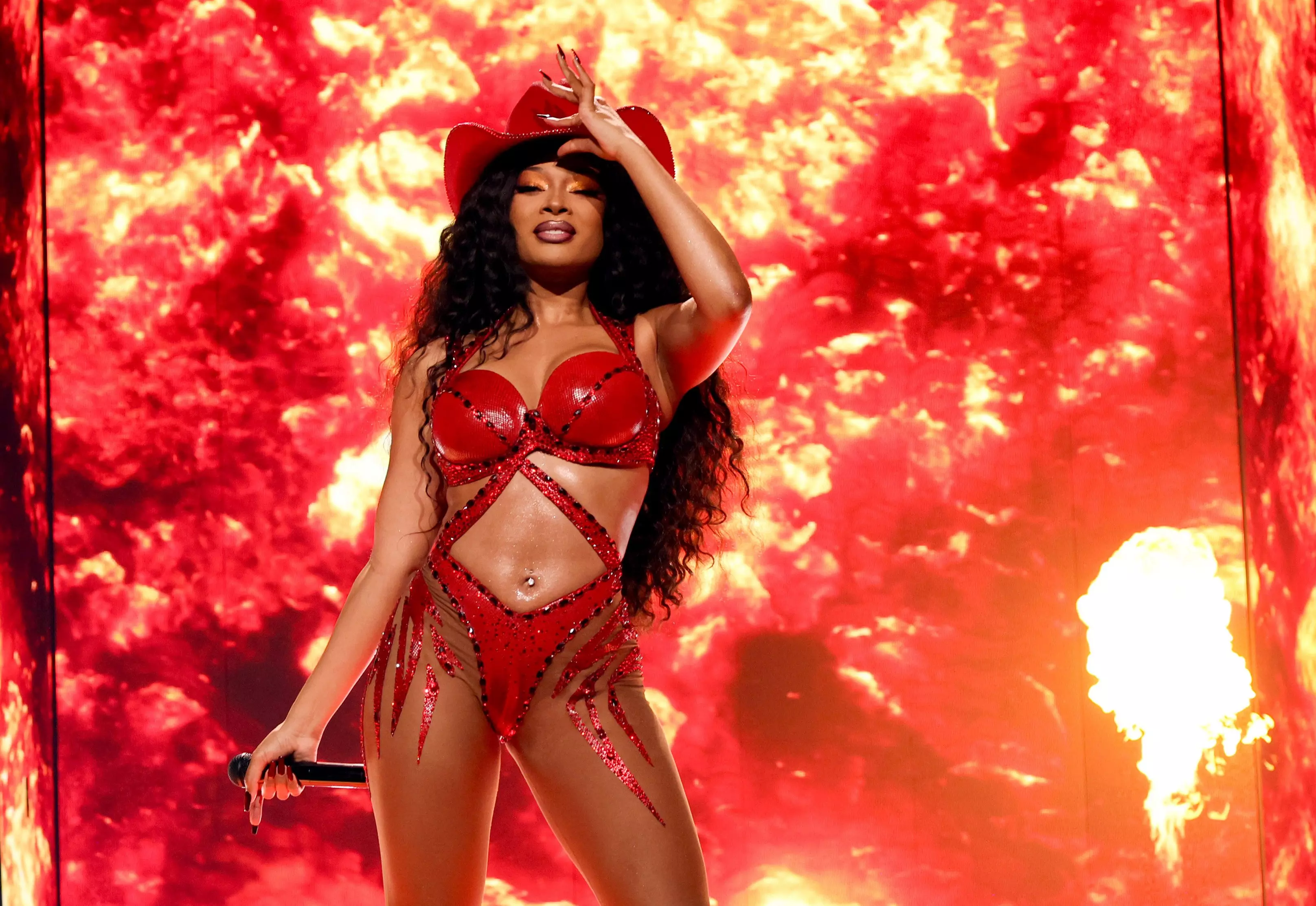
5 Iconic Moments From Megan Thee Stallion's Houston Hometown Shows
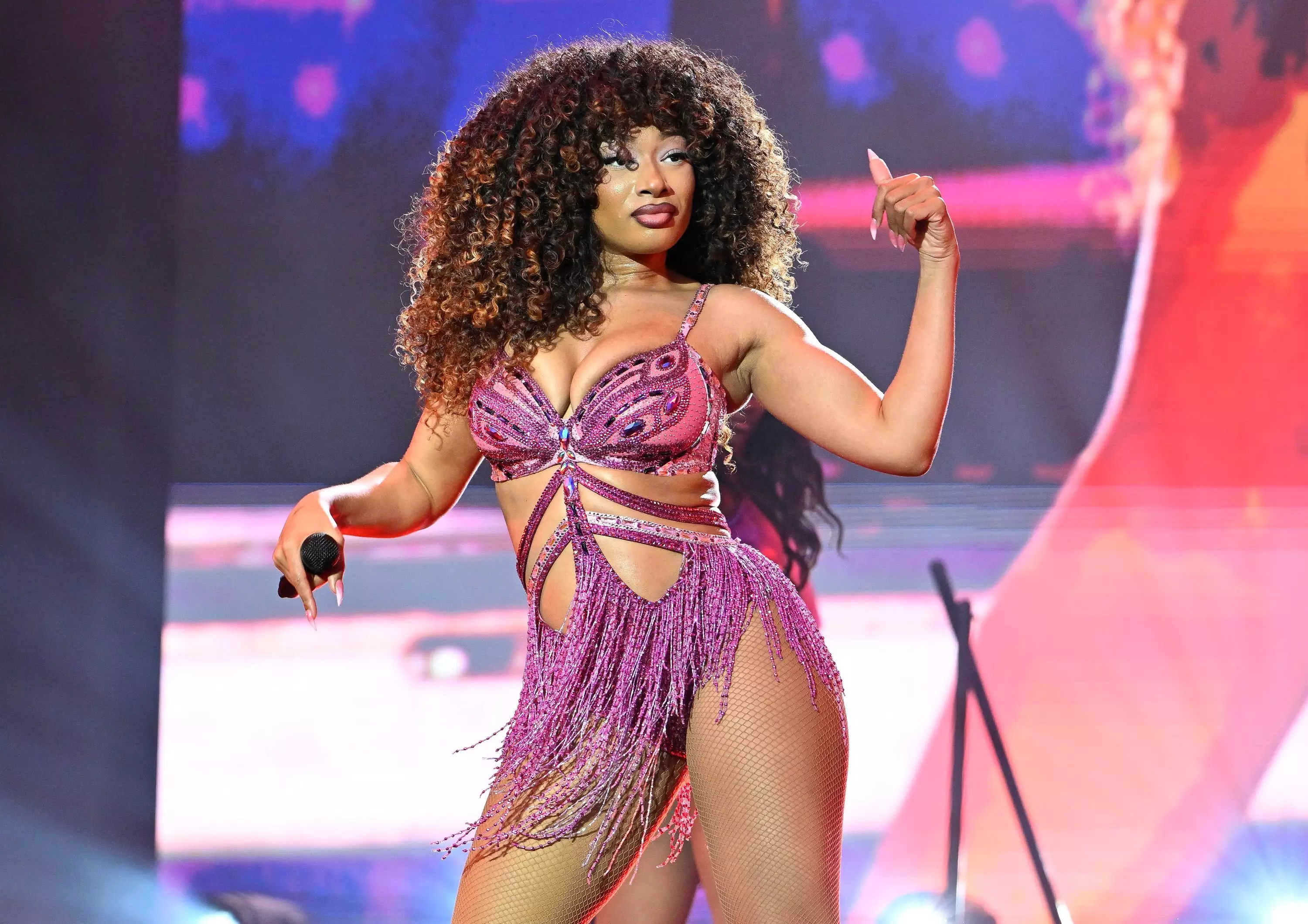
Everything We Know About Megan Thee Stallion's New Album 'Megan': Tracklist, Release Date & More
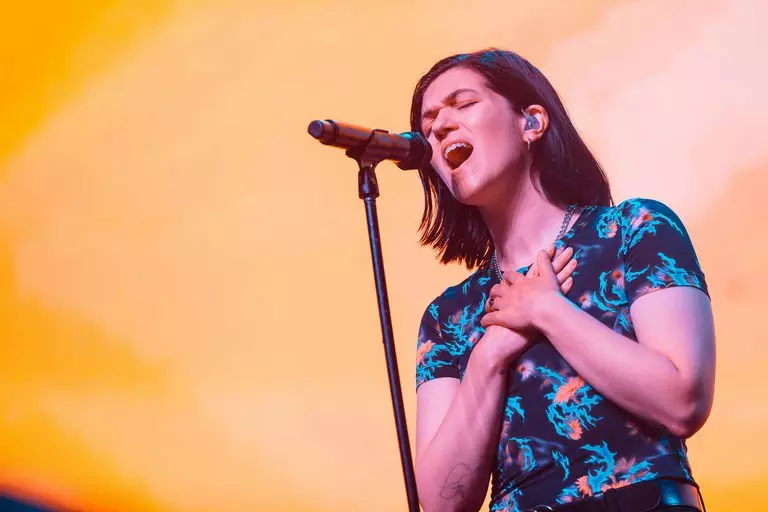
15 LGBTQIA+ Artists Performing At 2024 Summer Festivals
Inspiration Comes From Everywhere
The star and her collaborators incorporate unexpected musical influences on Megan via creative sampling. Megan Thee Stallion speeds up and flips Teena Marie's 1984 ballad "Out on a Limb" for "B.A.S." — a song she co-produced with her longtime ally LilJuMadeDaBeat. "BOA" is cleverly crafted from sounds in the first solo hit by Gwen Stefani, 2004’s "What You Waiting For?"
UGK are reunited from across the heavenly divide on the Juicy J-produced "Paper Together," with Bun B contributing new work and the late Pimp C joining in lyrical spirit. This is especially significant when considering that Juicy J produced "Intl’ Players Anthem (I Choose You)," UGK’s 2007 hit with Outkast. Juicy J also made the beats for Megan’s famous song "Hot Girl Summer."
That’s just the tip of the iceberg when it comes to samples waiting to be discovered on Megan. There are many more riffs and other musical notions that the sample bank in our brains have yet to detect.
Self-Love Is Queen
Whether she’s affirming, "I’m worthy, not worthless" on "Worthy," or literally touching herself in the auto-erotic "Down Stairs DJ" (which joins masturbation masterpieces like Divinyls’ "I Touch Myself" and Tweet’s "Oops"), Megan is grounded in songs that promote self-love as the best kind of love.
She does admit that this is sometimes a challenge to embody, as when she talks about lingering depression on "Moody Girl." But the album generally moves towards the light.
She Loves Japan
One of the big surprises on Megan is that she raps in two languages. She rhymes beautifully in Japanese on "Mamushi" with Yuki Chiba, a seasoned rapper from Japan who is influenced by the Southern swag. (Just take a look at the Memphis moves and Houston rhyme schemes of his viral song "Team Tomodachi.")
On "Otaku Hot Girl," she raps about the manga series "Naruto" and drops other anime references to show her love of Japanese pop culture.
Learn more: 10 Neo J-Pop Artists Breaking The Mold In 2024: Fujii Kaze, Kenshi Yonezu & Others
Megan's Game Is Tight
Megan is the first album to be released on Megan Thee Stallion’s own label. It follows her split from 1501 Certified Entertainment, a record label with which she was engaged in a protracted and ugly legal battle for earnings.
She now has the muscle of the major label Warner Brothers as a partner for her independent venture, Hot Girl Productions. She also recorded an Amazon Original song called "It’s Prime Day" for a commercial, as well as an exclusive Amazon edition of Megan.
It’s safe to say that this album represents a new level of business freedom and acumen for Megan Thee Stallion.
PRIDE & Black Music Month: Celebrating LGBTQIA+ & Black Voices

Celebrating 30 Years Of Essence Fest: How New Orleans & Multi-Generational, Diasporic Talent Create The "Super Bowl Of Culture"

Celebrating Missy Elliott: How The Icon Changed The Sound, Look & Language Of Hip-Hop

Tekno Talks New Music, Touring America & His "Elden Ring" Obsession

5 LGBTQIA+ Record Labels To Check Out: Get Better Records, So Fierce! And Others

Celebrate 40 Years Of Def Jam With 15 Albums That Show Its Influence & Legacy

Photo: Tim Mosenfelder/Getty Images
feature
How 'Petty Country: A Country Music Celebration' Makes Tom Petty A Posthumous Crossover Sensation
On 'Petty Country,' Nashville luminaries from Willie Nelson to Dolly Parton and Luke Combs make Tom Petty’s simple, profound, and earthy songs their own — to tremendous results.
If Tom Petty and the Heartbreakers landed in 2024, how would we define them? For fans of the beloved heartland rockers and their very missed leader, it's a compelling question.
"It's not active rock. It's not mainstream rock. It's not country. It would really fall in that Americana vein," says Scott Borchetta, the founder of Big Machine Label Group. "When you think about what his lyrics were and are about, it's really about the American condition."
To Borchetta, these extended to everything in Petty's universe — his principled public statements, his man-of-the-people crusades against the music industry. "He was an American rebel with a cause," Borchetta says. And when you fuse that attitude with big melodies, bigger choruses, and a grounded, earthy perspective — well, there's a lot for country fans to love.
That's what Coran Capshaw of Red Light Management bet on when he posited the idea of Petty Country: A Country Music Celebration of Tom Petty, a tribute album released June 21. Featuring leading lights like Dolly Parton ("Southern Accents"), Willie and Lukas Nelson ("Angel Dream (No. 2)," Luke Combs ("Runnin' Down a Dream"), Dierks Bentley ("American Girl,") Wynonna and Lainey Wilson ("Refugee"), and other country luminaries covering Tom Petty classics, Petty Country is a seamless union of musical worlds.
Which makes perfect sense: on a core level, Petty, and his band of brothers, were absolutely steeped in country — after all, they grew up in the South — Gainesville, Florida.
"Tom loved all country music. He went pretty deep into the Carter Family, and "Will the Circle Be Unbroken?" and the folk, Americana heart of it," says Petty's daughter, Adria, who helps run his estate. "Hank Williams, and even Ernest Tubb and Patsy Cline… as a songwriter, I think a lot of that real original music influenced him enormously." (The Flying Burrito Brothers, and the Byrds' Gram Parsons-hijacked country phase, were also foundational.)
A key architect of Petty Country was the man's longtime producer, George Drakoulias. "He's worked with Dad for a hundred years since [1994's] Wildflowers, and he has super exquisite taste," Adria says.
In reaching out to prospective contributors, he and fellow music supervisor Randall Poster started at the top: none other than Willie Nelson and Dolly Parton. "Having Willie and Dolly made people stand up and pay attention," Dreakoulias told Rolling Stone, and the Nashville floodgates were opened: Thomas Rhett ("Wildflowers"), Brothers Osborne ("I Won't Back Down"), Lady A ("Stop Draggin' My Heart Around"), and so many others.
Each artist gave Petty's work a distinctive, personal spin. Luke Combs jets down the highway of "Runnin' Down the Dream" like he was born to ride. Along with Yo-Yo Ma and founding Heartbreakers keyboardist Benmont Tench, Rhiannon Giddens scoops out the electronics and plumbs the droning, haunting essence of "Don't Come Around Here No More."
And where a lesser tribute album would have lacquered over the songs with homogenous Nashville production, Petty Country is the opposite.
"I'm not a fan of having a singular producer on records like this. I want each one of them to be their own little crown jewel," Borchetta says. "That's going to give us a better opportunity for them to make the record in their own image."
This could mean a take that hews to the original, or casts an entirely new light on it. "Dierks called up and said, 'Hey, do you think we would be all right doing a little bit more of a bluegrass feel to it?' I was like, 'Absolutely. If you hear it, go get it.'"
"It had the diversity that the Petty women like on the records," Adria says, elaborating that they wanted women and people of color on the roster. "We like to see those tributes to Tom reflect his values; he was always very pro-woman, which is why he has such outspoken women [laughs] in his wake."
Two of Petty Country's unquestionable highlights are by women. Margo Price chose "Ways to Be Wicked," a cut so deep that even the hardcore Petty faithful might not know it; the Let Me Up (I've Had Enough) outtake was buried on disc six of the 1995 boxed set Playback.
"Man, it's just one of those songs that gets in your veins," Price says. "He really knew how to twist the knife — that chorus, 'There's so many ways to be wicked, but you don't know one little thing about love.'" Founding Heartbreakers guitarist Mike Campbell features on the dark, driving banger.
And all interviewed for this article are agog over Dolly Parton's commanding take on "Southern Accents" — the title track of the band's lumpy, complicated, vulnerable 1985 album of the same name. "It's just revelatory… it brings me to my knees," Adria says. "It's just a phenomenal version I know my dad would've absolutely loved."
"It's one of Dolly's best vocals ever, and it's hair-raising," Borchetta says. "You could tell she really felt that track, and what the song was about."
Adria is filled with profuse gratitude for the artists preserving and carrying her dad's legacy.
"I'm really touched that these musicians showed up for my dad," she says. "A lot of people don't want to show up for anything that's not making money for them, or in service to their career, and we really appreciate it… I owe great debt to all of these artists and their managers for making the time to think about our old man like that."
Indeed, in Nashville and beyond, we've all been thinking about her old man, especially since his untimely passing in 2017. We'll never forget him — and will strum and sing these simple, heartfelt, and profound songs for years to come.
Let Your Heart Be Your Guide: Adria Petty, Mike Campbell & More On The Enduring Significance Of Tom Petty's Wildflowers

Photo: Arenovski
feature
Peso Pluma's Road To 'ÉXODO': The GRAMMY Winner Navigates The Consequences Of Global Stardom On New Album
"Fans really get to see the other side of the coin; there are two sides to me. It's darker, rawer," Peso Pluma says of his latest album 'ÉXODO'
Peso Pluma marked his musical destiny with a Tupac tribute tattoo in the center of his clavicle: "All Eyez On Me."
The Mexican artist, born Hassan Emilio Kabande Laija, doesn't remember exactly what year he inked his chest. He knows it was well before his debut in music. Those four words reflected Peso's irrefutable confidence that the world's eyes would eventually be on him.
The world's eyes are indeed on Peso Pluma. In less than two years, the singer achieved global fame by singing corridos tumbados, traversing a path never before trodden by a música Mexicana artist.
At 25, Peso Pluma is at the forefront of a new generation of música Mexicana artists that have successfully modernized traditional Mexican rhythms, such as corridos, by infusing them with elements from urban music and a hip-hop aesthetic. The weight of representing an entire genre and a country could be great for some. But pressure doesn't affect Peso Pluma; on the contrary, it motivates him to keep working to exalt his roots.
"We've come a long way, but we still have a long way to go. And that doesn't mean we have to slow down; it doesn't mean everything is over. This is the beginning of everything," Peso Pluma said in a TikTok video before a performance at the Toyota Arena in Ontario, Canada, a little over a year ago.
Out June 20, Peso's extensive new album ÉXODO seeks to cement his global star status further. Over 24 tracks, the singer continues to explore corridos tumbados and digs into his urban side via much-awaited collaborations with reggaeton and hip-hop icons. Among those big names is Peso's teenage idol, the American rapper and producer Quavo, as well as further afield collaborations with Cardi B.
"ÉXODO is a project I've been working on for over a year before we even won the GRAMMY. GÉNESIS was an incredibly special project, and I knew we couldn't make the same diamond twice," the singer tells GRAMMY.com in a written interview.
Peso Pluma's path to the global stage has been lightning-fast. While he started releasing songs in 2020, Peso will remember March 2023 as the month that propelled him into global mega-stardom. His collaboration with Eslabón Armado on "Ella Baila Sola" led him to become a household name outside his native Mexico.
The hit resonated with an audience eager for new sounds, accompanying social media videos and surpassing a billion streams on Spotify. "Ella Baila Sola" became the first Mexican music track to top the platform's global chart. On Billboard, it conquered No. 1 on the magazine's Global 200 chart for six weeks and reached the coveted No. 4 spot on the Hot 100 chart. The mega-hit took Peso Pluma and Eslabon Armado to make their Latin GRAMMY stage debut in November with an electrifying performance.
Another collaboration, "La Bebe (Remix)" with Mexican reggaeton artist Yng Lvcas, released a day after "Ella Baila Sola," also contributed to Peso Pluma's virality in a completely different genre, but one in which he feels comfortable: urban music.
Learn more: Peso Pluma's 10 Biggest Collabs: From "Bzrp Sessions" To "Ella Baila Sola" &"Igual Que Un Ángel"
As Peso Pluma gained traction with a global audience, his February 2022 single with Raúl Vega, put him, for better or worse, on the map in Mexico. The warlike content of "El Belicón" lyrics and video clip attracted attention for the way it allegedly promoted narcoculture.
Despite growing criticism, Peso Pluma remained tight-lipped regarding references to high-profile members of the Mexican drug trade, as well as drug use and trafficking. In a rare admission to GQ magazine, the singer explained this is a "delicate subject to talk about, but you have to touch on it with transparency — because it's the reality of things."
"In hip-hop, in rap, just like in corridos, and other urban music like reggaeton, it talks about reality. We're not promoting delinquency at all. We're only talking about things that happen in real life," the singer explained.
With the success of "El Belicón" and "Ella Baila Sola" under his belt, Peso Pluma released GÉNESIS in June 2023. Despite being his third album, Peso considers it his true debut in music.
"I didn't want to delete my previous albums [Efectos Secundario and Ah Y Que?] because they represent my beginnings," Peso told Billboard in a cover story published a few weeks after the release of GÉNESIS. In the same conversation, the singer said he saw himself winning his first GRAMMY and breaking more records.
Read more: 5 Takeaways From Peso Pluma's New Album 'GÉNESIS'
In February 2024, Peso Pluma did just that. He took home the golden gramophone for Best Música Mexicana Album (Including Tejano) — his first GRAMMY Award. This victory didn't weigh on him as he approached his next production. "It pushed me to want to create something different that the fans haven't heard from me before," Peso Pluma tells GRAMMY.com.
While GÉNESIS and ÉXODO may differ in substance, they share similarities beyond music. That both records pull from the Bible for their names is not a random occurrence; the opening book of the Hebrew and Christian Bible delves into the genesis of creation, while the Book of Exodus explores the themes of liberation, redemption, and Moses' role in leading the Israelites through the uncharted waters of the Red Sea.
"ÉXODO is the continuation of GÉNESIS, which was the beginning," Peso Pluma explains to GRAMMY.com. "ÉXODO means new beginnings, a new era for me. We are preparing for the next chapter, and that's what we are doing for Mexican music, paving the way, laying the groundwork for what's next because it doesn't stop here."
His "sophomore" album is divided into two discs: the first is corridos, and the second is urban. It also continues the line of collaborations, with twenty tracks where Peso Pluma shares the limelight.
"Some of my fans were craving música Mexicana, and some were craving urbano, and I wanted to give them everything while still staying true to myself and choosing songs and lyrics that spoke to me," he continues.
ÉXODO's disc one starts with "LA DURANGO," the album's fourth single, featuring Eslabon Armando and Junior H. In the record, he also invites collaborators such as Natanael Cano and Gabito Ballesteros for "VINO TINTO" and Mexican rising star Ivan Cornejo on the melancholic "RELOJ," among others.
For Side B, Peso enlisted heavyweights from the urban genre in the Anglo and Latin markets: Anitta in the steamy "BELLAKEO," Rich The Kid in the bilingual "GIMME A SECOND," and Quavo in the existential trap "PA NO PENSAR." Cardi B, Arcángel, Ryan Castro, Kenia OS, and DJ Snake complete ÉXODO's genre crossover.
In ÉXODO, luxury, drugs, alcohol, and women continue to take center stage in the lyrics, accompanied by fast-paced guitar-driven melodies and reverb-dense vocals. However, the production sheds light on the vulnerable side of Peso and explores the unexpected consequences of becoming globally famous.
"Fans really get to see the other side of the coin; there are two sides to me. It's darker, rawer," Peso says about the record.
In the songs "HOLLYWOOD" and "LA PATRULLA," for example, Peso details how this musical path keeps him up at night, as well as his aspirations, and how he remains the same despite his success.
Perhaps one of the deepest and rawest songs on the album is "14:14," a track inspired by the Bible verse 14:14 from the Book of Exodus, which, the singer explains, was fundamental amidst the turbulence he faced on the way to global stardom.
"[The] verse 14:14 says 'The LORD will fight for you; you need only to be still.' This verse couldn't be truer," Peso Pluma says. "Over time, I learned to really trust in this and believe that some things are not up to me and I should trust the process."
In the song — one of the few on the album without a collaboration — Peso references the challenges of his profession and how his faith has kept him afloat amid the vicissitudes. "Things from the job that no one understands/I hide the rosary under my shirt so I don't poison myself, so I don't feel guilty/because whatever happens, the Boss will forgive me," he sings.
In "BRUCE WAYNE," Peso Pluma croons about the passionate feelings his career arouses: "First they love you, and then they hate you/wishing the worst, envy and death," the song says.
The singer resorts to comparing himself to a superhero figure again. In an unusual twist, Peso crosses comic universes, moving from his now traditional reference to Spider-Man to one from the DC Comics world: Bruce Wayne, Batman's secret identity. A wealthy man, part of Gotham's high society, Bruce Wayne is known for transforming his darkness into power while remaining reserved and isolated.
"Everyone has two sides of them, even me," Peso tells GRAMMY.com. "Peso Pluma on stage is a high-energy person, someone who is powerful and dominates a show and isn't afraid of anything. And then there is Hassan, who's chill and more relaxed and who deals with all the realities of life."
During the year and a half it took him to complete ÉXODO, Peso Pluma had to deal with the diverse nuances of a global star's life, including a widely publicized breakup from Argentine rapper/singer Nicki Nicole, the cancellation of one of his shows in October 2023 after a Mexico drug cartel issued a death threat against him, and a media frenzy over his alleged admission to a rehabilitation clinic, the latest a rumor he laid to rest during a March interview with Rolling Stone for his Future of Music cover story.
"The reality is, all these days, I've been in the studio working on ÉXODO," the artist explained to Rolling Stone.
Most of 2023 was a successful balancing act for Peso Pluma, who combined touring, an album release, rare media engagements, two Coachella appearances, all the while developing another record. According to the singer, ÉXODO was created in Los Angeles, Miami, New York, and Mexico. "We go to the studio everywhere!" Peso says. "It doesn't really matter where we are; I love to get into the studio and work when we have free time."
Like GÉNESIS, ÉXODO will be released via Peso Pluma's Double P Records, of which he is the CEO and A&R. Much of the talent the Mexican singer has signed to his label took part in the album's production, and songwriting process.
"For the Mexican music side, I had the whole [touring] band with me; I like to have them involved in the process so that we can all give our input on how it sounds, discuss what we think needs to be changed, create new ideas," he explains.
Peso Pluma knows that echoing the success of 2023 is no easy task. He was the most streamed artist in the U.S. on YouTube, surpassing Taylor Swift and Bad Bunny, and was the second most-listened to Latin artist in the country, amassing an impressive 1.9 billion streams, according to Luminate.
Música Mexicana emerged as one of the most successful genres in 2023, witnessing a remarkable 60 percent surge in streaming numbers, adds Luminate's annual report, crediting Peso Pluma along Eslabon Armado, Junior H, and Fuerza Regida as part of this success.
Collaborations on and off the mic have undoubtedly played a significant role in the rise of Música Mexicana on the global stage. Peso knows that the key to continuing onward is teaming up with renowned artists inside and outside his genre.
"All of us coming together is what pushed música Mexicana to go global," the singer affirms. "We showed the world what Mexico has to offer, and now no one can deny the power and talent we have in our country."
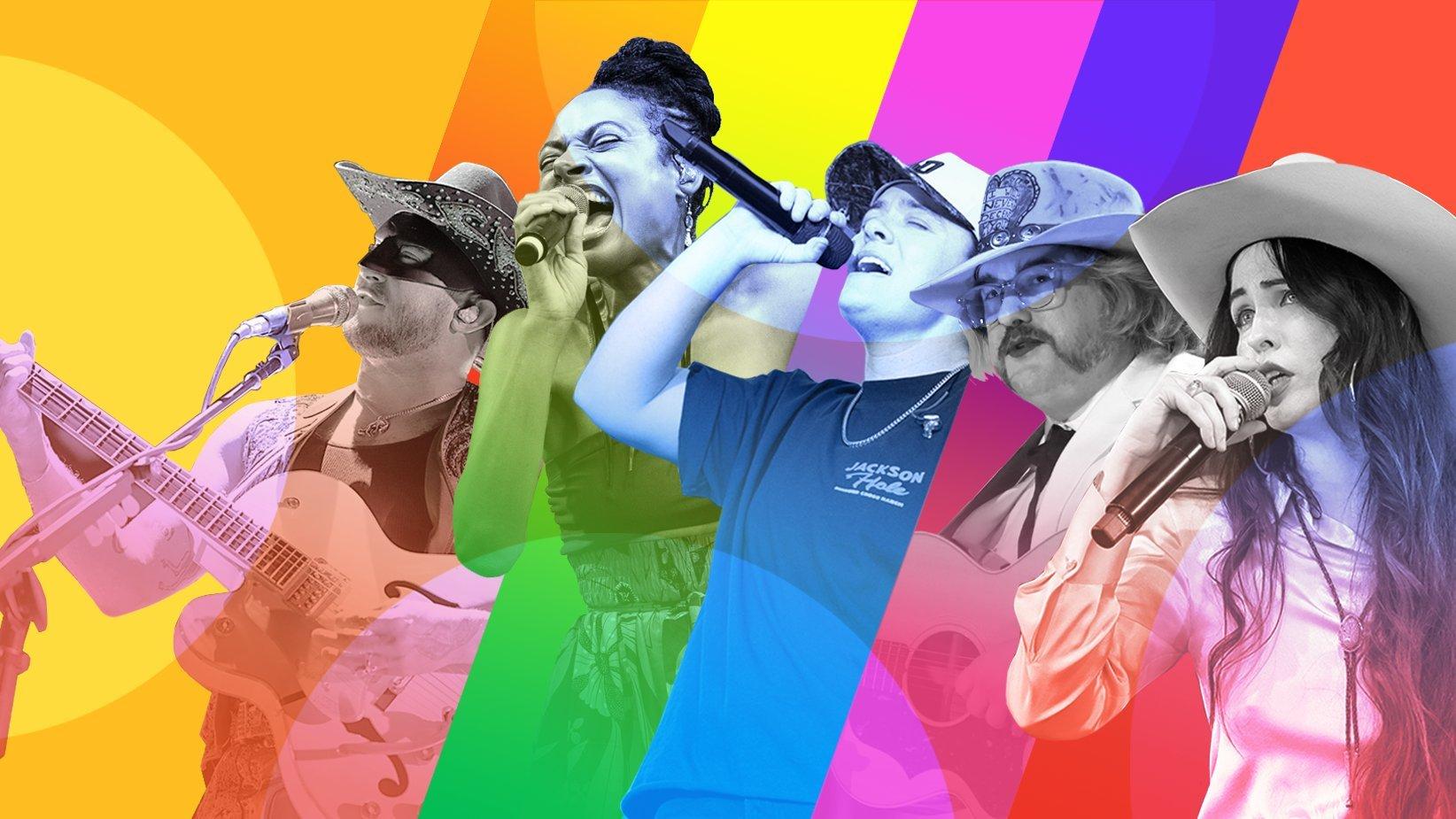
Photos (L-R): Jeff Hahne/Getty Images, Erika Goldring/Getty Images, Erika Goldring/Getty Images, Jason Kempin/Getty Images for Americana Music Association, Frazer Harrison/Getty Images for Stagecoach
feature
How Queer Country Artists Are Creating Space For Inclusive Stories In The Genre
As country music continues its global explosion, the genre is seeing a growing number of artists in the LGBTQIA+ community — including Adeem the Artist, Lily Rose and Jaime Wyatt — blaze a trail toward acceptance.
When country singer/songwriter Jaime Wyatt announced she was queer with the release of her second album, 2020's Neon Cross, she was convinced doing so would destroy her career. Instead, something shifted — not only was she more free to be herself and to date women openly, but many fans reacted positively, too.
"Several times on the road I've had fans come up to me with their same sex partner, and they're like, 'Hey, we feel safe here. It's so awesome because we both love country music, and we're not out of the closet, and we're not out to our families, but we can be here,'" Wyatt says.
Modern country music is generally perceived as a conservative genre, and deep-rooted cultural and industry biases have long excluded LGBTQIA+ (and BIPOC) artists and stories from the genre. For example, in 2010, when successful mainstream country artist Chely Wright came out, her career stalled and record sales halved. Kacey Musgraves was criticized for lyrics supporting same-sex love in her beloved anthem, "Follow Your Arrow." More recently, even, Wyatt walked out of a recording session after the owner of the space asked if she was singing "'some gay s—.'"
But Wyatt is also one of a growing number of country artists who, in recent years, have blazed a trail through country music and toward acceptance. Among them, Adeem the Artist, Mya Byrne, Brandi Carlile, Brandy Clark, Mary Gauthier, Lizzy No, Orville Peck, Lily Rose, and Allison Russell. Together, they're celebrating queerness alongside their love for the genre, and pushing it into diversity with patience, tenacity, and darn good country music.
"If you listen to popular music, or if you listen to hip-hop music, it feels like there's a broader diversity to a lot of subcultures as far as what you're able to access," nonbinary country singer/songwriter Adeem the Artist says. "Whereas with country music, it's very linear, it's very myopic, and singular in its expression."
By way of broadening country's storytelling, Adeem plays a honky-tonk blend of classic and '90s country music that's sonically aligned with the deep musical traditions in Tennessee, where they now live. Lyrically, though, their propensity for gorgeous, frankly worded songs complicate stereotypical southern narratives in rare and provocative ways. On White Trash Revelry, their 2022 studio album, they grapple with racism, economic entrapment, gun violence, and family heritage. And their latest, Anniversary, released in May, includes songs about mental health, the poignance of parenthood, and the pain and fear of being a queer person in a world that threatens their existence.
Indeed, some of the places in the U.S. with the strongest ties to country music remain the least hospitable to queer people. Just last year, Tennessee, home of Nashville, the country music capital of the world, passed a total of 10 bills aimed at LGBTQIA+ people, while Texas, perhaps country music's second-best known state, passed 20 percent of all anti-LGBTQIA+ legislation in the U.S. What's more, LGBTQIA+ people and culture have been targeted by numerous attacks around the world — including the Pulse nightclub and Club Q shootings stateside — in the last few years alone.
For many, the consequences of not coming out, of not sharing their full selves with the world, are risky, too. Growing up, Wyatt had no role model to show her it was okay to be queer. She struggled for years with mental health and substance abuse and was convicted of robbing her heroin dealer as a young adult. "I needed to see someone who looked like me when I was a young child," Wyatt says. "And maybe I wouldn't have been a dope fiend in jail."
But while straight white men comprise most of country music's standard slate of forebearers, women and people in the BIPOC and LGBTQIA+ communities have contributed to the genre since its beginning. Notably, it was Sister Rosetta Tharpe, a queer Black woman, who in the 1950s introduced reverb to gospel and rhythm and blues music — and in doing so, she forever changed guitar playing, and inspired some of country music's biggest trailblazers, from Elvis to Johnny Cash.
In 1973 — four years after the Stonewall uprising kickstarted a widespread gay liberation movement — Patrick Haggerty and his band Lavender Country released what is generally considered the first gay country album. But after it sold out its first pressing of 1000 copies, the album was mostly forgotten until 1999, when the Journal of Country Music published an article hailing Haggerty as "the lost pioneer of out gay country music." Haggerty began performing again and in 2014, indie label Paradise of Bachelors reissued the Lavender Country album, securing Haggerty status as a grandfather figure to queer country.
Haggerty's reissue landed in a different world than the album's original run. In the interim, a handful of artists released more queer country music, including Jeff Miller, aka "John Deere Diva," known for his George Strait parody, "Not Really Strait," as well as Doug Stevens and the Outband's When Love Is Right and Sid Spencer's Out-N-About Again, which put lyrically gay songs to country music.
In 2011, shortly before the Lavender Country reissue, queer country singer/songwriter and music scholar Karen Pittleman convened the first Gay Ole Opry in Brooklyn's now defunct Public Assembly performance space, launching more than a decade of queer country events, tours and a far-reaching network of performers and supporters. And in 2015, gay marriage became legal nationwide.
As progress has accelerated culturally in the near decade since, it has in country music, too. In 2018, Paisley Fields' debut album Glitter and Sawdust merged cowboy grit with queer raunch. In 2019, Lil Nas X's "Old Town Road" provoked country music to re-consider the nature and identity of country music. In 2021, T.J. Osborne of the Brothers Osborne became the first openly gay male artist signed to a major record label; a year later, the duo's song "Younger Me" — which was written in response to T.J.'s coming out — became the first country song with an LGBTQIA+ theme to win a GRAMMY. And this Pride Month, longtime LGBTQIA+ supporter (and GLAAD's 2023 Excellence in Media Award recipient) Maren Morris declared on Instagram, "happy to be the B in LGBTQ+."
"We as queer fans deserve to have songs that speaks specifically to us," says Rachel Cholst, a queer writer and educator. "And if that means putting in same gender pronouns, then we deserve that too. And if that makes a straight person uncomfortable, I don't know what to tell you. I've grown up my entire life having to internally change the pronouns to the love songs that really moved me."
Cholst started writing about music when she realized she couldn't be the only queer country fan out there. Her work aims to make queer country music accessible, and she has run the Adobe and Teardrops blog for more than a decade. In 2022, Cholst launched Rainbow Rodeo, a zine about queer country music, which appears bi-annually in print and regularly online.
"Everyone just assumed that country music is this one thing, and it never occurred to them to go look for it. That tells you a lot about how country music wants to present itself as an industry," Cholst says. "If we erase anyone who's not straight, anyone who's not white, then what you're saying is, you want those people to be erased from the conversation, from the culture."
Beyond using she/her pronouns in love songs (which she didn't get to do on her first album, Felony Blues), Wyatt's powerful, steely queer country music complicates social consciousness. Incisive and elegant in her delivery, she's equally compelling chronicling her conviction and jail time on Felony Blues, confronting demons and figuring out who she is on her Shooter Jennings-produced second album, Neon Cross, and outlining her hopes and frustrations for the world on her third album, 2023's sultry, groovy, Feel Good.
Wyatt's knack for catchy and advocacy-laced country bangers is clearest in "Rattlesnake Girl," one of her most popular songs. In it, she offers an anthemic celebration of joy unfettered: "I see my sweet friends out on the weekend/ They all look happy and gay," and a barbed warning to anyone who might impinge on that happiness: "Thank you kindly, don't walk behind me/ I've seen people slip that way/ And if you try me, boot heels beside me/ I might have to make your day."
Queer country music means something a little different to each artist. For many, it's about much more than simply being a queer person performing country music. Adeem the Artist considers queer country its own genre, complete with specific rules — many of which have nothing to do with sexual or gender orientation.
"It is explicitly political in nature. It is often kind of raunchy," they assert. "There's an element to queer country that is confrontational, that is willing to create discomfort for the sake of a relief that leans towards some greater social awareness."
To some degree, raising awareness and representation — which is essential for inclusion and acceptance — requires a bit of self-tokenization, Adeem says. "The very, very basic act of referring to me as a person who is queer, who is trans, who is nonbinary, who is whatever, those labels only do good as much as they illuminate the differences between us and the fact that I am more difficult for some people to relate with."
Adeem and Wyatt both operate within the alt-country scene, which has been marginally more inclusive than mainstream country over the years. Recently, though, rising country musician Lily Rose cracked through with her viral breakup single, 2020's "Villain." On her latest EP, Runnin' Outta Time (which she released in May), she sings a high-octane pop/country mix about her values and relationships. It's a well-worn country music landscape that has been almost exclusively dominated by heterosexual white men.
"To be one of the first to literally [and] figuratively, carry the flag... it makes me really proud. And it has its heavy moments for sure," Rose says. "Night after night, when I get to meet fans and see comments on social media that they feel seen for the first time in the genre, it's really special and it makes every single second of hard work to get here worth it."
The day after Runnin' Out of Time dropped, Rose made her Grand Ole Opry debut with two songs from the album, "Back Pew" and "Two Flowers"; Adeem and Wyatt also played the Opry for the first time in the last year as well. The Opry, one of country music's oldest and most lauded tastemakers, has welcomed a number of queer artists in the last few years, signaling a subtle shift toward a more inclusive country music institution. (In addition, all three artists recently scored high-profile touring spots: Rose with Shania Twain and Sam Hunt, Adeem with Tyler Childers and Jason Isbell and the 400 Unit; and Wyatt wrapped up her first headlining tour.)
For Pittleman, an essential part of making music is ensuring space for anyone who wants to make music to do so, regardless of how they look or identify. "Most people who like country music, they just want to hear country music," Pittleman says. "I want to have a good time, too. But you have to ask at a certain point, 'Who is invited to the good time?'"
As she insists, there's a long way to go. In a digital world, radio play doesn't offer a complete picture, but it remains a dominant force in country music. For decades, women have been played sparingly on country radio and artists of color and queer musicians featured far less, a shortcoming which SongData's principal investigator, Jada Watson, spent years studying. Her research concludes that women country artists are played roughly 29 percent of the time, Black artists 5 percent, and other artists of color 7 percent. Queer artists, Watson estimates, make up less than 1 percent of radio play.
"The real problem is who's making those decisions; who has the power and as a result, who has the power and the resources to record their music, to distribute their music, to get it out on a broader scale," Pittleman suggests. "We have to make sure that everyone who's called to make the music has the resources and the power to make it and bring it into the world."
And in spite of multitude setbacks and naysayers, queer artists are creating country music. As Pittleman wrote in a 2020 essay in the Journal of Popular Music Studies titled "You're My Country Music," one of the joys of singing queer country music is making country music, plain and simple. "The point is to mark the deepest moments of human connection, our truest hopes and heartbreaks, and turn them into a sound that gives us joy and strength," she says.
"Because sometimes you love a culture that doesn't love you back," Pittleman continues on the Gay Ole Opry's about page. "We do it because we love the music and want to build a community to support queer country musicians. We do it because everybody needs a honky-tonk angel to hold them tight. We do it because we believe in country music for all."
Why 2024 Is The Year Women In Country Music Will Finally Have Their Moment
PRIDE & Black Music Month: Celebrating LGBTQIA+ & Black Voices
Listen To GRAMMY.com's 2024 Pride Month Playlist Of Rising LGBTQIA+ Artists
9 New Pride Anthems For 2024: Sabrina Carpenter's "Espresso," Chappell Roan's "Casual" & More
What's The Future For Black Artists In Country Music? Breland, Reyna Roberts & More Sound Off
Why Beyoncé Is One Of The Most Influential Women In Music History | Run The World
9 Ways To Support Black Musicians & Creators Year-Round
How Beyoncé Is Honoring Black Music History With 'Cowboy Carter,' "Texas Hold Em," 'Renaissance' & More
The Evolution Of The Queer Anthem: From Judy Garland To Lady Gaga & Lil Nas X
15 LGBTQIA+ Artists Performing At 2024 Summer Festivals
50 Artists Who Changed Rap: Jay-Z, The Notorious B.I.G., Dr. Dre, Nicki Minaj, Kendrick Lamar, Eminem & More
Fight The Power: 11 Powerful Protest Songs Advocating For Racial Justice

How Rihanna Uses Her Superstardom To Champion Diversity | Black Sounds Beautiful

How Beyoncé Has Empowered The Black Community Across Her Music And Art | Black Sounds Beautiful
5 Women Essential To Rap: Cardi B, Lil' Kim, MC Lyte, Sylvia Robinson & Tierra Whack
Celebrate 40 Years Of Def Jam With 15 Albums That Show Its Influence & Legacy

Watch Frank Ocean Win Best Urban Contemporary Album At The 2013 GRAMMYs | GRAMMY Rewind
A Brief History Of Black Country Music: 11 Important Tracks From DeFord Bailey, Kane Brown & More
10 Women In African Hip-Hop You Should Know: SGaWD, Nadai Nakai, Sho Madjozi & More
10 Artists Shaping Contemporary Reggae: Samory I, Lila Iké, Iotosh & Others
The Rise Of The Queer Pop Star In The 2010s
How Sam Smith's 'In The Lonely Hour' Became An LGBTQIA+ Trailblazer
How Queer Country Artists Are Creating Space For Inclusive Stories In The Genre

How Jay-Z Became The Blueprint For Hip-Hop Success | Black Sounds Beautiful

How Kendrick Lamar Became A Rap Icon | Black Sounds Beautiful
Dyana Williams On Why Black Music Month Is Not Just A Celebration, But A Call For Respect
6 LGBTQIA+ Latinx Artists You Need To Know: María Becerra, Blue Rojo & More
7 LGBTQ+ Connections In The Beatles' Story
Breaking Down Normani's Journey To 'Dopamine': How Her Debut Album Showcases Resilience & Star Power
10 Alté Artists To Know: Odunsi (The Engine), TeeZee, Lady Donli & More

Celebrating Black Fashion At The GRAMMYs Throughout The Decades | Black Music Month
FLETCHER Is "F—ing Unhinged" & Proud Of It On 'In Search Of The Antidote'
For Laura Jane Grace, Record Cycles Can Be A 'Hole In My Head' — And She's OK With That
15 Essential Afrorock Songs: From The Funkees To Mdou Moctar
50 Years In, "The Wiz" Remains An Inspiration: How A New Recording Repaves The Yellow Brick Road
Why Macklemore & Ryan Lewis' "Same Love" Was One Of The 2010s' Most Important LGBTQ+ Anthems — And How It's Still Impactful 10 Years On
Songbook: The Complete Guide To The Albums, Visuals & Performances That Made Beyoncé A Cultural Force

Why Cardi B Is A Beacon Of Black Excellence | Black Sounds Beautiful
Queer Christian Artists Keep The Faith: How LGBTQ+ Musicians Are Redefining Praise Music
9 Revolutionary Rap Albums To Know: From Kendrick Lamar, Black Star, EarthGang & More
9 "RuPaul's Drag Race" Queens With Musical Second Acts: From Shea Couleé To Trixie Mattel & Willam
5 Black Artists Rewriting Country Music: Mickey Guyton, Kane Brown, Jimmie Allen, Brittney Spencer & Willie Jones
How 1994 Changed The Game For Hip-Hop

How Whitney Houston’s Groundbreaking Legacy Has Endured | Black Sounds Beautiful
LGBTQIA+-Owned Venues To Support Now

Celebrate The Genius Of Prince | Black Sounds Beautiful

Explore The Colorful, Inclusive World Of Sylvester's 'Step II' | For The Record
Black-Owned Music Venues To Support Now
5 Artists Fighting For Social Justice Today: Megan Thee Stallion, Noname, H.E.R., Jay-Z & Alicia Keys
Artists Who Define Afrofuturism In Music: Sun Ra, Flying Lotus, Janelle Monae, Shabaka Hutchings & More
5 Trans & Nonbinary Artists Reshaping Electronic Music: RUI HO, Kìzis, Octo Octa, Tygapaw & Ariel Zetina
From 'Shaft' To 'Waiting To Exhale': 5 Essential Black Film Soundtracks & Their Impact
5 Emerging Artists Pushing Electronic Music Forward: Moore Kismet, TSHA, Doechii & Others
5 Artists Essential to Contemporary Soca: Machel Montano, Patrice Roberts, Voice, Skinny Fabulous, Kes The Band

How Quincy Jones' Record-Setting, Multi-Faceted Career Shaped Black Music On A Global Scale | Black Sounds Beautiful
5 Black Composers Who Transformed Classical Music
Brooke Eden On Advancing LGBTQ+ Visibility In Country Music & Why She's "Got No Choice" But To Be Herself
Let Me Play The Answers: 8 Jazz Artists Honoring Black Geniuses
Women And Gender-Expansive Jazz Musicians Face Constant Indignities. This Mentorship Organization Is Tackling The Problem From All Angles.

Histories: From The Yard To The GRAMMYs, How HBCUs Have Impacted Music
How HBCU Marching Band Aristocrat Of Bands Made History At The 2023 GRAMMYs
